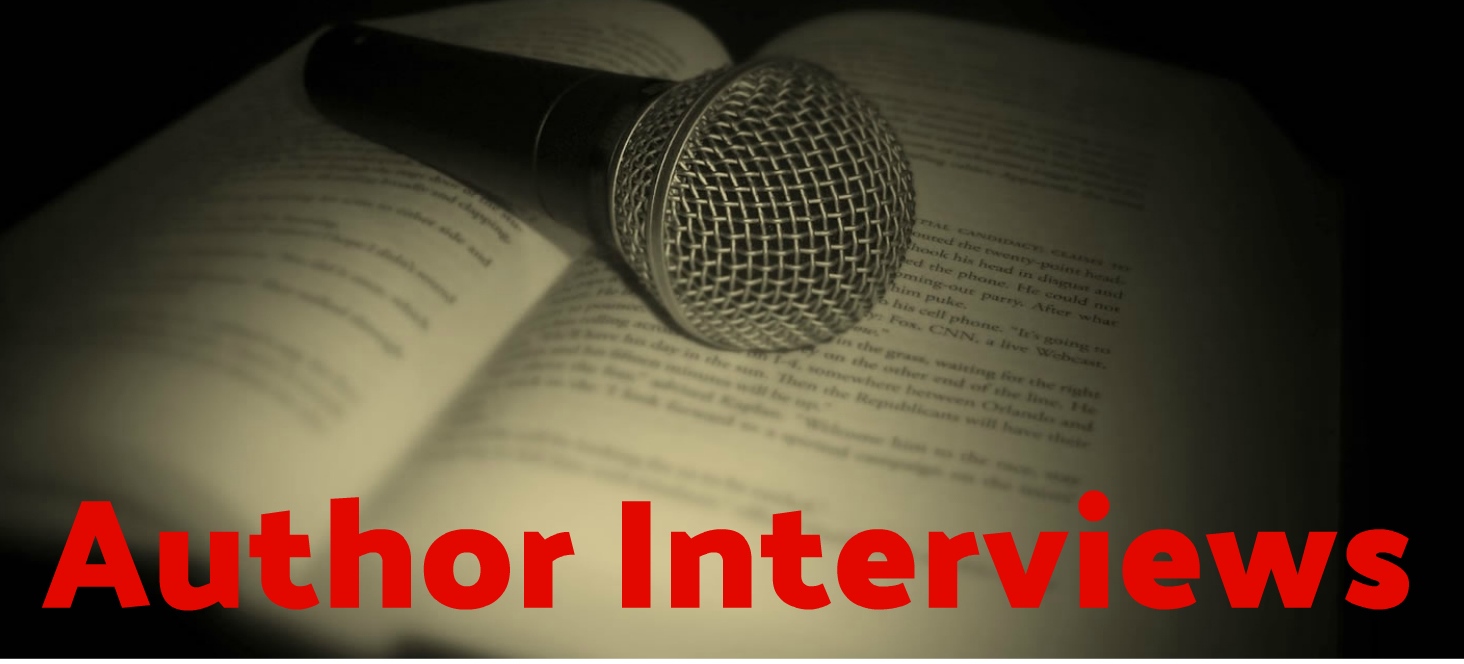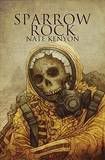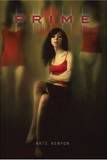
In-Depth Discussions with Today's Darkest Talents
Nate Kenyon: Writing from the Edge
By, Vince A. Liaguno
The last time we caught up with Nate Kenyon back in the fall of 2008, he had just released The Reach, the much-anticipated follow-up to Bloodstone, his 2006 Bram Stoker Award-nominated debut. Since then, the busy dark scribe has released Prime, a science fiction novella from Apex, and both The Bone Factory and Sparrow Rock, his third and fourth Leisure novels, respectively.
 It’s the latter that’s the focus of our sit-down today. Hailed by DSM as being “relentless in its intensity”, “agonizing in its heartbreak”, and “easily one of the most effective and satisfying novels of dark fiction you’re likely to read this year,” Sparrow Rock is a favorite around our editorial offices. We wanted to know more from Kenyon – a lot more – about Rock’s inside workings and the process of creating his latest apocalyptic fiction frightfest.
It’s the latter that’s the focus of our sit-down today. Hailed by DSM as being “relentless in its intensity”, “agonizing in its heartbreak”, and “easily one of the most effective and satisfying novels of dark fiction you’re likely to read this year,” Sparrow Rock is a favorite around our editorial offices. We wanted to know more from Kenyon – a lot more – about Rock’s inside workings and the process of creating his latest apocalyptic fiction frightfest.
Dark Scribe Magazine: Welcome back to DSM, Nate. Tell us about your new book, Sparrow Rock.
Nate Kenyon: Thanks for inviting me back! Sparrow Rock is a wild one, my personal favorite of my own novels. It’s about a group of teens on the edge of adulthood who go looking for a place to party one night and find themselves trapped in a bomb shelter at the end of the world. But that’s only the beginning – because it’s not just a nuclear attack, and there is something else out there that is bent on destroying every last human on earth – something the world has never seen before. Something ruthless, vicious…and hungry.
Sparrow Rock is about friendships pushed to the breaking point, about our own, inner demons, and about figuring out who you really are when the chips are down. It’s also my darkest, craziest and most fun book yet.
Dark Scribe: This book is somewhat of a departure for you from previous efforts. What was the inspiration behind the novel?
Nate Kenyon: It came from a dream I had about the end of the world — very vivid and disturbing. I wrote a short story that eventually grew into the novel. I describe the process in more detail here in an essay I wrote for the Leisure website.
Dark Scribe: Sparrow Rock has a very cinematic feel to it, at times feeling like one of those grand old B-movies. What were some of the film influences that played into the novel?
Nate Kenyon: Oh, yeah. I really wanted to nail that. The Thing was definitely a major influence — the sense of being trapped, the claustrophobia, and then something coming after you. The Omega Man was another. The Day After, that TV movie from the 80s influenced me too. I really wanted to capture that feeling of a film in novel form, so I’m glad it came through that way.
Dark Scribe: The novel has an ensemble cast, but a first-person narrator – the first time you’ve written one of your books from this point of view. Why did you decide to tell the story of Sparrow Rock from the first-person perspective and how did you decide from which character’s POV to tell the story from?
Nate Kenyon: Because the story began as a dream, it had a very immediate, personal feel to me, and it just made sense to tell it in the first person. Pete took over the novel very quickly, and I really wanted to play with the various fun things you can do when you tell a story that way — that was a challenge to me, but I don’t want to say much more and give away the ending! I had a blast with it — probably the most fun I’ve had writing a book. A lot of writers talk about how the first person can be limiting and difficult to work with, but Sparrow Rock just flowed out for me. I think Pete Taylor is one of my strongest and most interesting characters.
Dark Scribe: What were some of the added challenges of narrating an entire novel from one person’s POV?
 Nate Kenyon: You know, I didn’t really have a problem there. Normally, I think it’s tough to figure out ways to describe action that’s happening outside of that person’s POV, and/or the feelings of another character without getting inside their heads. Maybe it was the confines of the shelter keeping all the action front and center, but this one felt easy to me. It just clicked.
Nate Kenyon: You know, I didn’t really have a problem there. Normally, I think it’s tough to figure out ways to describe action that’s happening outside of that person’s POV, and/or the feelings of another character without getting inside their heads. Maybe it was the confines of the shelter keeping all the action front and center, but this one felt easy to me. It just clicked.
Dark Scribe: Your cast of characters is composed of five high school kids. Being a decade or two removed from that demographic, how did you imbue these characters with such a genuine sense of authenticity?
Nate Kenyon: I didn’t think much about it. Maybe I’m just immature (laughs). I do have a couple of teenage kids though, so that could have helped me. I really just wrote them the way I would like to read them myself, if I were reading another writer’s novel. I wanted these to be smart kids who are struggling with the transition to adulthood. Since the plot was about life and death, they had to grow up fast. There was no time for angst about who was going to prom or what kind of party they were going to throw when they graduated. They had to act.
Dark Scribe: Did you find it challenging to communicate the weightier, more adult themes of the novel through the eyes, ears, and voice of a high school kid without him sounding like an adult full of life-experience?
Nate Kenyon: That’s a good question. A better writer probably would have worried more about this; I just wrote them the best way I could. The thing is, Pete Taylor very quickly became like a real person to me. He had a real voice, and as corny as it sounds, I just let him talk. I guess it worked!
In all seriousness, I think we all still have those versions of ourselves from different stages of our own lives trapped inside us somewhere. Who among us hasn’t felt something like an awkward teen in particular moments even years after we’ve become an adult? My own teenage doppelganger was inside my own head, I think; I just let him out for a while to help me with this book.
Dark Scribe: The novel is heavy stuff – some might even characterize the story as being bleak. Were you worried about reaction to the downbeat feel of Sparrow Rock? I mean, nuclear holocaust doesn’t leave much room for hope.
Nate Kenyon: It is bleak. I did worry a little bit about that, but hell, this is horror fiction, right? I mean readers have to know it’s gonna get rough. There was a particular story I needed to tell, and I decided early on I wasn’t pulling any punches to tell it the right way.
Dark Scribe: These are scary, uncertain times we’re living in right now. I mean, when the Canadians start to riot, you know we’re in some deep shit. How did current global crises play into Sparrow Rock? And are these things that keep you up at night?
Nate Kenyon: You’re right. I do think the general unease we’re feeling, from the economy to terrorism, definitely played into writing this book. We’re all on edge. I think we feel more vulnerable as a country these days, and so themes like this – the end of the world – are in our minds, and are important to explore through fiction. It’s cathartic to go through them on the printed page and come out the other side more or less whole, but (hopefully) with a better understanding of yourself and what it means to be human. I think that’s the main role horror in general plays for people.
Dark Scribe: One of the things that really impressed me about the book was its genuine sense of empathy for the characters and the human emotion on display as the teens’ bunker predicament grows increasingly worse. As a writer – particularly one who writes in horror – how did you balance the emotional aspects of the story with the more horrific elements?
Nate Kenyon: I’m always interested in this. I think that’s what makes for great horror — characters who live and breathe, those who you can sympathize with and root for, so that when you bring the wet stuff – which I was always intending to do – it’s that much more effective. Particularly in a novel like this, which can descend into melodrama and be overwhelmingly over the top, I think it’s important that the characters, and the emotions they’re feeling, resonate with the reader. These are just kids, they have their own sets of problems, and then you thrust them into a situation like this — we need to feel their pain, understand what they’re facing, and feel like we’re going through it with them.
Dark Scribe: You shared with us the last time you were here how you tragically lost both parents at a young age. Sparrow Rock continues to explore the child-parent dynamic and the idea of being left behind by someone expected to see you through to adulthood, but inverts it a bit this time with parent being left behind by the child – and the child struggling with the accompanying emotions of not being there when (in this case) a disabled parent needs him. Is your exploration of this particular theme therapeutic for you? I imagine that this is where much of the sincerity in your writing – particularly in the aspect of the human emotions you take your characters through – comes from.
Nate Kenyon: Oh, yeah, definitely. Although it wasn’t a conscious choice, I think there was a lot of myself in that part of this book. My mother battled her cancer for five years, and much of the last part of it she was very sick. I remember her needing more help, and I remember being pretty selfish, and how guilty I felt after the fact for being such a self-absorbed little shit during that time. I was twelve and thirteen and that’s the way teens are at that age, but that doesn’t change the guilt you feel over it.
So I do think Pete’s struggles over leaving his mother behind are rooted in my own psyche, and my constant need to understand myself, my past, my own shortcomings. There are a number of other important emotional themes in Sparrow Rock that hit home for me and have to do with the break up of my marriage, which was ending about the time I finished this book. There I was, my sense of my own life and my family imploding, holed up in my basement office and writing about the end of the world. I guess that’s what fiction is all about — exploring our own issues and getting things out on paper, even if they might manifest as plagues and war and the walking dead. I think it was King who said writers are some of the most well-adjusted people on earth, because we get all our angst out on paper!
Dark Scribe: Were there any scenes or narrative threads that were excised before the book went to print?
Nate Kenyon: Nope. This novel was a remarkable experience for me. There were a few minor scenes cut from the original short story, before I began to write the novel, but the vast majority of what you read now is how it came out of me, over the course of a couple of months. I never really hit a wall, I never felt like anything wasn’t working pretty well and flowing the right way. It just clicked.
Dark Scribe: What can you share about your next novel? Will you revisit this more balls-to-the-wall, breakneck-paced kind of narrative in your next effort?
Nate Kenyon: My next one is a real departure, in that I’m doing a StarCraft novel for Pocket Books and Blizzard Entertainment. StarCraft, for those who aren’t familiar with it, is one of the best-selling and most beloved PC video games of all time, and there’s a sequel due very soon, which will indirectly tie into the novel I’m writing, although it’s not a novelization of the game itself. It’s a sci fi space opera-type story, lots of fun, and I’m having a blast with it. As one might expect, I’m bringing a pretty dark tinge to the story, which I think the editors wanted (one reason they hired me). It’s going to be creepy and wild and I think the fans are going to love what we’re doing with it.
Beyond that, I’m not sure. I have a thriller called Riding the Wire that’s going out to editors soon, and it’s sort of the cross between Dean Koontz, Michael Crichton and The Matrix. It’s great fun. And I’m starting to think about my next horror novel — got an interesting idea there that I want to run with, as soon as I finish StarCraft Ghost: Spectres.
I should also say that I set up Sparrow Rock for a sequel, and I do intend to write that someday. There’s a lot more to this story that I want to tell.
Dark Scribe: The recent upheavals over at Dorchester that resulted in longtime Leisure editor Don D'Auria's exit from the venerable horror imprint shocked many. How has Dorchester's move into the digital realm affected you specifically?
Nate Kenyon: I saw this coming a while back, so I did not sign to do a new novel with Leisure after Sparrow Rock, and moved on to start writing for Pocket Books and Blizzard Entertainment instead (my next novel, Starcraft Ghost: Spectres, will come out from Pocket next year). Because of this, I'm not as affected as some other authors who had new novels on the schedule, but of course my backlist is tied up there, and it remains to be seen how their plans will play out. I'm a big believer in the digital future of publishing – I think that within five years, the vast majority of books will be sold in eBook format – but I'm not convinced that this move was made for the right reasons. Time will tell. I think we're at a tipping point in the publishing business, and many larger shakeups are waiting in the wings.
For more about Nate Kenyon, visit his official author website.



